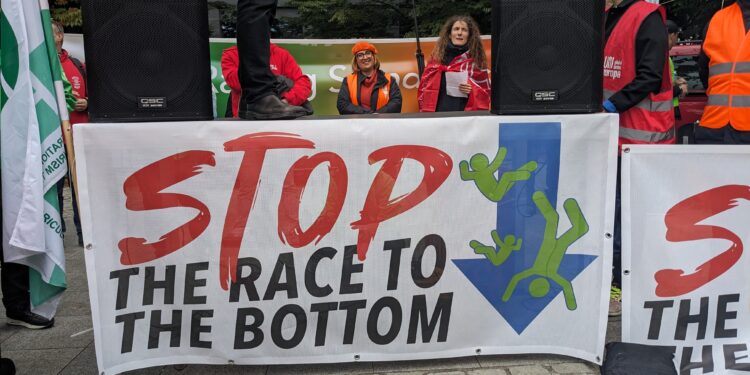Brussels – In Jean Rey Square, nestled between the European Parliament and the EU Council in Brussels, workers in the essential sectors—cleaners, security services and hospitality workers— gathered this morning (Oct. 1) to call on the EU institutions to stop the “race to the bottom” and initiate an organic review of the rules governing public procurement in a direction that is finally favourable to workers instead of benefiting only companies.
While the airports of the European capital were shut down because of the rally, representatives of the trade unions present (UNI Europe, EFFAT and ETUC at the European level, plus several other organizations from different member countries, including Italy’s CGIL Filcams) demanded from the stage of the demonstration better working conditions, salaries commensurate with the cost of living, and more effective collective bargaining for workers in the affected sectors, who, they say, are unfairly penalized by European rules on public procurement. Among the claims is that they were instrumental in keeping communities going during the most sensitive phases of the COVID-19 pandemic when entire economies ground to a halt to contain the contagion.
“Public procurement, or the contracting of private firms by public authorities to provide goods and services, amounts to two trillion euros,” reads a note from the UNI Europa association, or “about 14 per cent of the European Union’s GDP.” The note continues, “The standards created through public procurement affect wages and working conditions throughout the private sector.” According to the organization, about half of the public tenders held in the Twenty-Seven would be awarded to companies that offer the lowest price without considering the social costs that communities bear.
Oliver Roethig, regional secretary of UNI Europe, reiterated that “public money should be an investment in good jobs and clean, safe, and healthy communities.” “We realized this during COVID: without cleanliness, without security, without food services, our societies don’t work,” he said from the stage. “Everyone was talking about how essential you were, and we applauded you from the balconies. Now what? You have disappeared again. Everyone ignores you,” he pressed.
He and other organizers argued that change must take place at the European level. Commission President Ursula von der Leyen’s promise to revise European rules for public procurement must now be fulfilled, and the rules in question must be reformulated in the interests of workers.
For Filcams CGIL, Paola Massetti spoke: “We are here to ask politics, the European Commission, for fair tenders,” she explained to Eunews, pointing out that workers in the restaurant and catering sector are often “forced into involuntary part-time which leads to a situation of extreme poverty,” since working “ten hours a week you can never emancipate yourself, you can never get out of professional segregation.” In order to end this spiral, it is necessary that tenders can be won by “whoever offers more, whoever offers fairness, whoever offers a decent wage, otherwise workers will always be poor, will always be on the margins of society.” After all, he said, “the condition of contract workers is the same throughout Europe, so there needs to be a common and collective struggle, even if states have different jurisdictions.”
English version by the Translation Service of Withub




![Il commissario per l'Economia, Valdis Dombrovskis, in conferenza stampa a Strasburgo [12 febbraio 2025]](https://www.eunews.it/wp-content/uploads/2025/02/dombro-250212-120x86.png)
